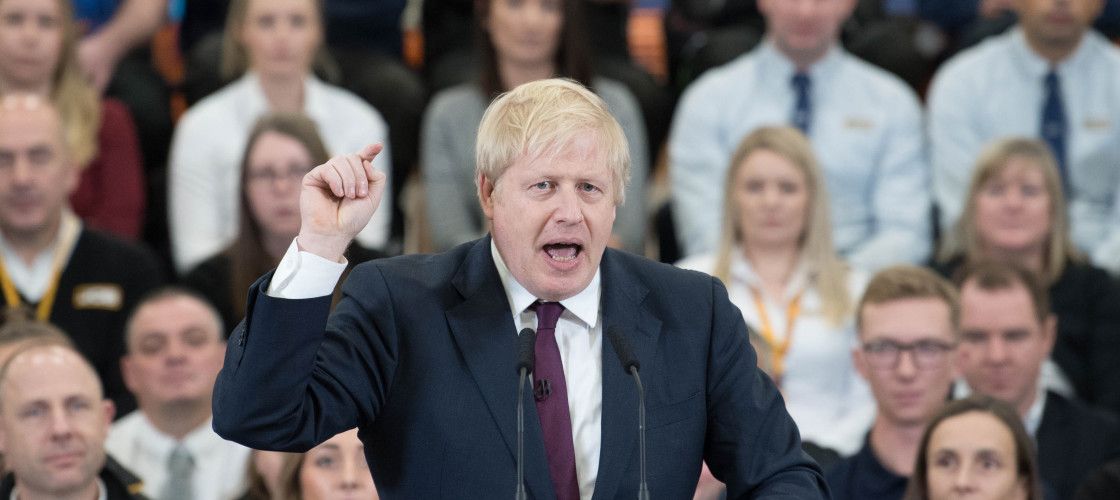What the Conservative Party’s historic win means for the future of the UK

A few minutes every morning is all you need.
Stay up to date on the world's Headlines and Human Stories. It's fun, it's factual, it's fluff-free.
On December 12, Great Britain held its third general election in five years and voters delivered an overwhelming victory to the Conservative Party. The historic win for the party and its leader, Boris Johnson, was a stark rejection of the opposition Labour party and will mark the end of Jeremy Corbyn’s tenure as Labour’s leader.
The Conservative win also paves the way for Brexit to be finalized in January.
Historical results
While the polls consistently showed the Conservative Party holding a strong lead over the other parties, the “stunning” margin of victory was larger than many expected and the defeat for Labour was labeled “crushing.” The Conservatives won a total of 365 seats in Parliament, far more than the 326 seats (out of 650) needed for a majority government.
In the end, the Conservative Party gained 47 Members of Parliament (MPs). The Labour Party came in second, with 203 seats (for a loss of 59 seats), followed by the Scottish National Party (SNP), which won 48 seats (out of the 59 available in Scotland). The Liberal Democrats, led by Jo Swinson and running on a campaign of stopping Brexit, won a total of 11 seats, down from 12, with leader Swinson losing her seat to her SNP rival.
67.3% of registered voters in the UK turned out to vote.
With his party winning a solid Conservative majority, Boris Johnson claimed to have a “stonking mandate” to carry out his party’s agenda, an agenda that by and large involves concluding negotiations with the European Union (EU) that will result in Britain’s leaving the bloc.
Important issues in the election
A number of issues other than Brexit were important in the election, including the fate of Britain’s National Health Service (NHS) and concerns over anti-Jewish and anti-Muslim bigotry, but through it all Johnson made it clear that his first priority was concluding Brexit negotiations by the EU’s deadline of January 31.
If those negotiations are successful, the UK will officially leave the EU more than three and a half years after the vote to do so was initially taken. That decision, with a turnout of 72.2%, resulted in 52% of registered voters electing to leave over the 48% who wished to remain.
The Conservative manifesto
Prior to the election, the Conservative Party posted their manifesto on their website. It includes promises to increase funding to the NHS and add 50,000 more nurses (critics have derided these numbers as dubious). The manifesto also promises to implement an “Australian-style points-based system” to control immigration numbers as well as increase the number of police by 20,000.
It’s clear that many voters saw the general election as a choice between “getting Brexit done”, in Conservative parlance, or holding a second referendum (with the possibility of overturning the first referendum).
Jeremy Corbyn’s response and Labour’s future
A day after the Labour party’s disappointing loss, Jeremy Corbyn vowed that he would step down as its leader, though he will stay on until the end of March to give the party time to elect someone new. On Twitter, Corbyn took responsibility for the party’s “heavy defeat”.
A number of contenders, many of whom are women, are likely to vie for Labour’s leadership. They include the MP from the northern city of Salford, Rebecca Long-Bailey, who is supported by a number of important members of the party. If elected to the position, she would be the first female leader in the party’s history.
Many within Labour want to move the party away from Corbyn’s policies and take it out of the hands of his supporters. The next few months will determine whether this will happen.
What happens next with Brexit
The road to Brexit has been a long and winding one, involving the resignation of two Conservative prime ministers. When Johnson took over as prime minister after Theresa May stepped down, he promised to have the nation out of the EU by October 31. That didn’t happen and a parliamentary stalemate opened the door to last week’s general election.
Now with an election mandate and far greater support in parliament, Johnson will likely find it easier to get his Withdrawal Agreement Bill through. While that would result in the UK leaving the EU by the end of January, the process would not be over as a trade deal with the EU would still need to be worked out by the end of June. This trade deal would take effect by the end of 2020.
EU member states are able to trade goods freely and the union negotiates trade with other countries as a bloc.
During the election, Johnson admitted there was still a chance the UK could leave the EU without a deal. This would lead to the creation of new border checkpoints and delays in the transportation of goods. The rules for UK citizens living abroad – and EU citizens living in the UK – would also be uncertain.
Have a tip or story? Get in touch with our reporters at tips@themilsource.com




Comments ()